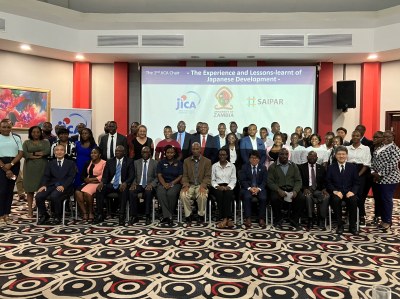Former Executive Directors Deliver Special Lectures in Zambia on Japan’s Development Experiences
2023.05.13
The second JICA Chair was convened in Zambia on Feb. 22, 2023, to share the experiences accumulated during Japan's own modernization process and Japan’s overseas development cooperation. Eighty participants from the University of Zambia (UNZA) and relevant ministries of the central government of Zambia attended the event cohosted by the UNZA, the Southern African Institute for Policy and Research (SAIPAR), and JICA. Takahara Akio, former executive director of the JICA Ogata Sadako Research Institute for Peace and Development delivered the keynote speech titled “How a Resource-Poor Japan Achieved Development: Successes and Failures.” Visiting Fellow Kitano Naohiro (a professor at Waseda University and also a former executive director) lectured on “Japan’s Development after World War II: Lessons to Enhance Connectivity and Respond to Urbanization.”

Participants pose for a group photo
Godfrey Hampwaye moderated the session; he was previously a senior lecturer at the UNZA (Department of Geography and Environmental Studies) and is the current SAIPAR Researcher. In their opening remarks, Onesmus Munyati, dean of the Faculty of Natural Sciences at UNZA, and Yonebayashi Norihito, Chief Representative at the JICA Zambia Office, expressed the hope that Japan's knowledge-sharing about the history of its development would inspire Zambian youth and contribute to the further development of the country. Subsequently, a member of the JICA Zambia Office presented the four pillars of JICA’s projects in Zambia: private sector development, agriculture, social development, and infrastructure development.
Takahara explained that resource-poor Japan considers its human capital a national asset and has focused on capacity development. He also enumerated the qualities and limitations of the Japanese teamwork (group) system, which has contributed to Japan’s growth by enabling individuals to work collectively and overcome insufficient individual strengths.
Kitano elucidated the history of Japan's rapid economic growth after World War II: Japan enhanced connectivity through donor-funded infrastructure development. Kitano also mentioned the negative aspects of fast growth, for instance, pollution. He expressed the hope that Zambia's recent focus on fostering the private sector would continue to exert a substantive impact on its future development. As an example, he mentioned the development of a special economic zone in southern Lusaka that he had observed during his visit.
During the Q&A session that followed the speeches, participants asked how Japan achieved free education despite being financially impoverished after World War II, how the country is tackling its recent population decline and accelerated aging, and how Research and Development institutions and private companies have contributed to Japan's regional development. A lively discussion ensued among the speakers and the participants.

事業事前評価表(地球規模課題対応国際科学技術協力(SATREPS)).国際協力機構 地球環境部 . 防災第一チーム. 1.案件名.国 名: フィリピン共和国.

事業事前評価表(地球規模課題対応国際科学技術協力(SATREPS)).国際協力機構 地球環境部 . 防災第一チーム. 1.案件名.国 名: フィリピン共和国.

事業事前評価表(地球規模課題対応国際科学技術協力(SATREPS)).国際協力機構 地球環境部 . 防災第一チーム. 1.案件名.国 名: フィリピン共和国.

事業事前評価表(地球規模課題対応国際科学技術協力(SATREPS)).国際協力機構 地球環境部 . 防災第一チーム. 1.案件名.国 名: フィリピン共和国.

事業事前評価表(地球規模課題対応国際科学技術協力(SATREPS)).国際協力機構 地球環境部 . 防災第一チーム. 1.案件名.国 名: フィリピン共和国.
scroll